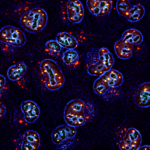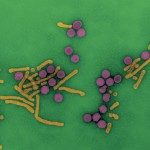Lien vers Pubmed [PMID] – 17283120
Cancer Res. 2007 Feb;67(3):901-10
Tbx3 encodes a transcriptional repressor that is important for diverse patterning events during development, and Tbx3 mutation in humans causes the ulnar-mammary syndrome. Here, we describe the identification of Tbx3 in array-based search for genes downstream Wnt/beta-catenin that are implicated in liver tumorigenesis. Overexpression of Tbx3 is closely associated with the mutational status of beta-catenin in murine liver tumors induced by Myc as well as in human hepatocellular carcinomas and hepatoblastomas. Moreover, Tbx3 transcription is activated by ectopic expression of beta-catenin in mouse liver and in human tumor cell lines. Evidence that Tbx3 transcription is directly regulated by beta-catenin is provided by chromatin immunoprecipitation and reporter assays. Although HepG2 cells stably transfected with Tbx3 display moderately enhanced growth rate, the dominant negative mutant Tbx3-Y149S drastically inhibits hepatoma cell growth in vitro and in vivo. Moreover, small interfering RNAs (siRNA) directed against Tbx3 inhibit anchorage-independent growth of liver and colon carcinoma cells. We further show that inhibition of Tbx3 expression by specific siRNAs blocks beta-catenin-mediated cell survival and renders cells sensitive to doxorubicin-induced apoptosis. Conversely, ectopic expression of Tbx3 inhibits apoptosis induced by beta-catenin depletion. Marked overexpression of Tbx3 in a subset of hepatoblastomas is associated with chemotherapy-resistant phenotype and unfavorable patient outcome. These results reveal an unsuspected role of Tbx3 as a mediator of beta-catenin activities on cell proliferation and survival and as an important player in liver tumorigenesis.


